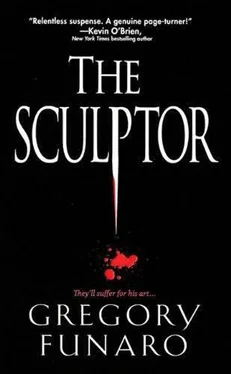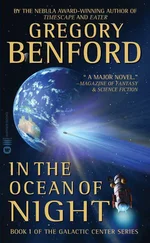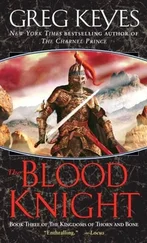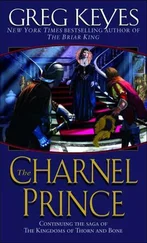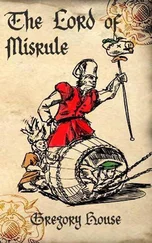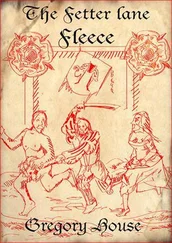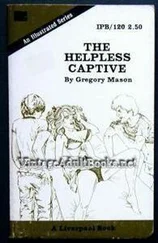Tommy Campbell and Michael Wenick were just material for his exhibition, he said to himself. Just as the epoxy compound and the wood and the iron and everything else was. Just one component of his art, of his message, of his quest to wake us from our slumber.
Material.
Markham flipped to the page in Slumbering in the Stone that he had dog-eared a couple of hours earlier-to the quote from Michelangelo which he had underlined in red: “The more the marble wastes, the more the statue grows.”
Marble. Michelangelo’s material-some of which he would transform into works of artistic brilliance; some of which, depending on its location in the block itself, he would damn to the studio floor, to the garbage heap. Hence, both a reverence for the material itself, but yet the understanding that some would have to be discarded.
Dead bodies. The Michelangelo Killer’s material. He had to have experimented on others before Campbell and Wenick, had to have used humans before perfecting his technique-some of whom, perhaps just pieces at first, he transformed into plastinated works of art; others he simply discarded as waste. Hence, both a reverence for the material, the male figure as aesthetically superior, and the understanding that he would need to waste some of his victims to achieve greatness.
Marble. Material. Waste. Dead bodies. The male figure as aesthetically superior.
Something didn’t quite add up.
Something that was so close, so simple , yet still just so far out of reach.
Markham sighed and flicked off his desk lamp. He would force himself to sleep, to think about something else for a while. And as he crawled into bed, his thoughts immediately ran to Cathy Hildebrant. Markham hated to admit how much he had missed her over the last three days; he hated even more to admit how much he was looking forward to seeing her again. However, what really bothered Markham was the nagging suspicion that he was missing something very important; something that might put the art history professor in danger; something that might make him lose someone he cared about all over again.
Steven Rogers prided himself on his youthful appearance. At forty-five and with a head full of curly brown hair that he dyed regularly, the handsome theatre professor was still sometimes carded at the bars along with his graduate student girlfriend-a rare but flattering enough experience to which he actually looked forward, specifically, the patented double take from the doorman or waitress upon seeing the age on his driver’s license. Blessed in part with good genes, it was really his deep-seated sense of vanity that kept him looking so young-coupled with an unconscious desire to always be appealing to the opposite sex. Yes, Steven Rogers ran six miles five times a week; watched his fat and carb intake; still used the Bowflex that his ex-wife bought him for his fortieth birthday; and still lived whenever possible by the old adage his doting mother hammered into him as a child: “Early to bed, early to rise, Steven, makes a man healthy, wealthy, and wise.”
Healthy? Yes. Wealthy? He couldn’t really complain. But wise? Well, even Steve Rogers would have to agree that the jury was still out on that one.
Yes, Rogers had done a lot of dumb things in his forty-five years on this planet-the dumbest of all, perhaps, leaving those e-mails from Ali on his computer. It had been an honest mistake. He had to uninstall then reinstall his AOL software, forgot to change the “save mail to computer” setting, and his wife found everything a few months later. That was the worst part , Steve thought: The e-mails had been on there for months before Cathy happened to come across them.
Stupid stupid stupid.
No, Ali Daniels was not Steve Rogers’s first indiscretion during his twelve-year relationship with Cathy Hildebrant-his first student , yes, but not his first affair. There had been a handful of others of which his ex-wife was entirely unaware: a summer theatre actress here and there and a regular fling with an old girlfriend he ran into twice a year on the conference circuit. The latter had been going on since before both of them got married, so Rogers did not feel the slightest bit guilty about that one. Besides, she was the one with the kids.
In fact, Rogers was actually proud of himself for the degree to which he had remained “faithful” to Cathy Hildebrant over the course of their twelve-year relationship-for in his bachelor days he had been quite the satyr. Indeed, Steve Rogers always had a sneaking suspicion that if he had put as much effort into his acting career as he had into getting laid, he might have been the next Brando-or at least the next Burt Reynolds. He had often been compared to the latter in his youth-a comparison that he downright resented while at Yale; and later, one that he used to his advantage in his early thirties as a second-rate regional theatre actor.
Oh yes, Rogers was very, very vain. But more than his vanity, Rogers carried with him an unconscious yet subtle resentment for the hand that life had dealt him. True, on paper he had much to be proud of-after all, he was a graduate of the prestigious MFA in Acting Program at Yale University, and he was a tenured faculty member and the senior acting instructor in the Department of Theatre, Speech, and Dance at Brown University. Nonetheless, Rogers secretly felt like something of a failure-felt that for some reason the deck had been stacked against him from the beginning. It really had nothing to do with his mediocre acting career. No, even before entering Yale at the age of twenty-two, Rogers had already begun to feel as if he was somewhat unappreciated by his constituents, as if nobody really understood the depth of his talent. But rather than grow into a sense of bitterness, Steve Rogers’s perception of his place in the world evolved over the years into a sense of entitlement, of being owed something-so much so that when he cheated on Cathy Hildebrant, he actually felt like he deserved some recreational pussy for giving in to the concept of marriage in the first place.
Yes, cheating was one thing- getting caught was another . It was as if for Rogers only an acknowledgment of the act itself by the betrayed could really define it as adultery-If a tree falls in the forest and no one is there to hear it, yada yada yada.
And so, more than the hurt he had caused his ex-wife, more than the guilt of his failed marriage, Rogers would forever curse himself for being so stupid as to let fate get the best of him once again. Sure, Cathy could have screwed him; she could have really taken him for a bath if she had wanted to-so yeah, he had to concede his good fortune with regard to the painlessness of his divorce. However, Steve Rogers could not help but feel somewhat the victim-could not help but feel somewhat abandoned. When it came right down to it, Rogers hated to admit to himself that he wished Cathy had fought just a little bit harder, been just a little bit more aggressive and spiteful to him over the last four months-for that would have proven that he really had meant something to her.
Yes, as his career as a second-rate actor had taught him, the only thing worse than hate was indifference.
Ironically, it was with a certain amount of indifference that Rogers held Ali Daniels-that great piece of graduate student ass whose MySpace generation I-have-to-get-an-e-mail-from-you-every-day-now-that-we’ve-fucked neediness ruined his good thing with Cathy. True, Steve Rogers had loved Cathy Hildebrant as much as he could possibly love someone other than himself-probably still did, in a way. And true, he was self-aware enough to realize that he had been jealous of her at times-of her PhD, of the success of her book and, most recently, of the attention she had received as a consultant or whatever-the-fuck-she-was on that nutbag Michelangelo case. Nevertheless, Rogers understood that he would miss Cathy and the routine, the security, the practical convenience of the life they had carved out as a couple. If only he had heeded his working-class father’s advice like he did his mother’s; if only he had lived by that credo, perhaps none of this nonsense would have happened to begin with.
Читать дальше
